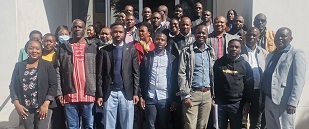
Ntara at Musese inaugurates three new classrooms for 116 primary learners

Unveiling the plaque to mark the official opening of the new block of classrooms at Ntara Combined School at Musese in the Kavango West region, were the Deputy Minister of Education, Arts and Culture, Hon Ester Nghipondoka, and the Ambassador of Japan, HE Hideaki Harada, representing the donor.
The new classrooms were inaugurated last week at a ceremony on the school’s premises. This social investment of just over N$900,000 brings the total donor-spend by the Japan International Cooperation Agency (JICA) to almost N$45 million for 61 projects over a 22-year period. Ntara is the 36th Namibian school benefitting from grants by the Government of Japan.
Ntara Combined School, founded in 1935, today accommodates 680 learners served by 23 teachers.
As the number of school-going children increased, the old facilities became inadequate, forcing many learners to attend school in makeshift classrooms put together with corrugated zink. This situation was detrimental to the children’s education since the summer heat in the Kavango becomes extreme when a large group occupies a metal structure.
In stepped the Japanese Government with a grant under its Grassroots Human Security Projects to construct three proper bricks and mortar classrooms and a store room. The grant included 60 desks and chairs.
The new classrooms are now used for 81 Grade 4 and 35 Grade 5 learners.

Immediately after the opening ceremony, a Japanese volunteer science and maths teacher, Gosuke Sakai San, presented a demo-lesson to mark the first formal instruction in a new classroom.
The JICA Volunteer Programme forms part of Japan’s multi-pronged approach to development in education which couples capacity building and human resource development with infrastructure improvement with the intent to maximise the quality of education.














































